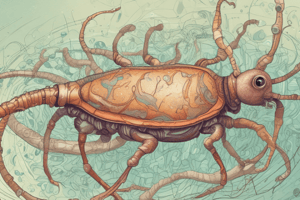Podcast
Questions and Answers
What is the primary purpose of critical thinking in writing a biology paper?
What is the primary purpose of critical thinking in writing a biology paper?
- Repeating existing literature
- Identifying gaps in current knowledge (correct)
- Using complex terminology
- Summarizing data in the results section
Which section of a biology paper involves engaging with existing literature?
Which section of a biology paper involves engaging with existing literature?
- Abstract
- Introduction
- Methods
- Discussion (correct)
How does critical thinking contribute to effective data analysis in biology papers?
How does critical thinking contribute to effective data analysis in biology papers?
- By summarizing data inaccurately
- By designing flawed experiments
- By avoiding data analysis
- By evaluating the reliability of scientific claims (correct)
Which section of a biology paper presents the main findings and their implications?
Which section of a biology paper presents the main findings and their implications?
How does critical thinking aid in writing a well-structured biology paper?
How does critical thinking aid in writing a well-structured biology paper?
Flashcards are hidden until you start studying
Study Notes
Critical Thinking in Biology: A Guide to Writing and Research
Biology, as a scientific discipline, demands a high level of critical thinking to interpret complex concepts, analyze data, and develop a well-supported argument. This article will explore critical thinking within the context of biology and provide tips for writing and researching biology-related topics.
The Importance of Critical Thinking
Critical thinking in biology encompasses the use of logical reasoning and evidence-based analysis to evaluate the validity and reliability of scientific claims. This skill is essential for researchers to generate testable hypotheses, design experiments, analyze data, and communicate their findings effectively.
Writing a Biology Research Paper
When writing a biology research paper, follow these steps:
- Select a topic of interest, relevant to the field, and significant enough to contribute to the body of knowledge.
- Conduct a thorough literature review to familiarize yourself with the existing research.
- Outline your paper, including the introduction, methods, results, discussion, and conclusion.
- Use statistical tests and visuals to present your results effectively.
- Write the discussion section to interpret your results in light of your research question and propose future research directions.
- Use the right terminology and follow ethical research and reporting practices.
The Structure of a Biology Paper
A biology paper typically follows this structure:
- Abstract: A summary of the paper's purpose, methods, results, and conclusions.
- Introduction: Explain the research question or hypothesis and its significance.
- Methods: Describe the research methods and procedures used to answer the research question.
- Results: Present the data and findings in a clear and concise manner.
- Discussion: Interpret the results in light of the research question, engage with existing literature, and propose future research directions.
- Conclusion: Summarize the main findings and their implications, and suggest possible applications of the research.
The Role of Critical Thinking in Writing
Critical thinking is essential for writing a well-structured and compelling biology paper. It helps you:
- Identify gaps in the current knowledge and contribute to the field.
- Evaluate the reliability and validity of scientific claims.
- Design experiments and analyze data effectively.
- Communicate findings clearly and effectively to a wide audience.
Conclusion
Critical thinking is a fundamental skill in biology, enabling researchers to identify gaps in the current knowledge, design experiments, analyze data, and communicate their findings effectively. By using logical reasoning and evidence-based analysis, you can develop well-supported arguments and contribute to the advancement of the field.
Remember to adhere to the guidelines for writing in the biological sciences, follow ethical research and reporting practices, and use the right terminology when writing biology papers. By doing so, you'll be able to present your findings in a clear, logical, and compelling manner, contributing to the body of knowledge and fostering scientific progress.
Studying That Suits You
Use AI to generate personalized quizzes and flashcards to suit your learning preferences.




